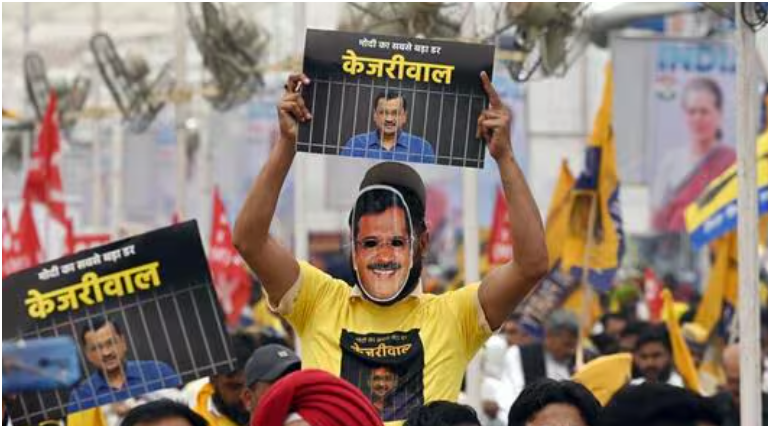Delhi Ramlila Maidan Echoes with Protests and Slogans, Chaos Unleashed
Delhi Echoes with Protest and Defiance at Ramlila Maidan
Protesters from various parts of the country, including Punjab, Uttar Pradesh, Haryana, and Maharashtra, converged at Ramlila Maidan in central Delhi to participate in a massive rally. Thousands of volunteers and supporters from diverse opposition parties assembled to express solidarity with Delhi Chief Minister Arvind Kejriwal and former Jharkhand Chief Minister Hemant Soren. Both leaders had been arrested by the Enforcement Directorate (ED) in connection with alleged irregularities in the Capital’s excise policy for the year 2021-22 and a money laundering case related to an alleged land scam, respectively.

Amidst a sea of banners and chanting slogans, the protesters vehemently demanded the immediate release of Kejriwal and Soren. They accused the Bharatiya Janata Party (BJP)-led Central government of orchestrating the arrests as a means to disrupt the upcoming Lok Sabha elections, labeling them as “dictators” wielding power to stifle dissent.
Singh and his companions positioned themselves near the music system, where members of the Aam Aadmi Party (AAP) from Delhi and Punjab sang Punjabi songs, denouncing the Enforcement Directorate as “cheaters” for apprehending Kejriwal.
One protester, Jawahar Lal, adorned himself as Lord Ram, symbolizing his allegiance to the cause. Lal, who had previously been affiliated with the BJP and even contested elections from Sohna in 2009, declared his support for the Congress and AAP during these challenging times.
According to a senior Delhi Police officer, more than 10,000 individuals attended the rally, necessitating stringent security measures. Over 1,500 police personnel and Central Reserve Police Force (CRPF) staff were deployed to maintain law and order at the venue. Additionally, the Delhi Police implemented restrictions on movement near prominent areas such as Chandni Chowk, Pragati Maidan, ITO, and Connaught Place, causing minor disruptions to traffic flow between 11 am and 2:30 pm.
In a contrasting narrative, Delhi BJP chief Virendra Sachdeva dismissed the rally as a “flop show,” criticizing the AAP for its perceived failure to mobilize adequate support. Sachdeva contended that despite the presence of 61 AAP MLAs, the rally failed to attract even 6,100 attendees, which he interpreted as a sign of diminishing support for the AAP in Delhi.
In the midst of diverging perspectives and political tensions, the rally at Ramlila Maidan served as a poignant reflection of the deep-seated divisions and fervent passions that characterize contemporary Indian politics. As protesters voiced their grievances and rallied behind their leaders, the event underscored the enduring significance of public mobilization and activism in shaping the country’s democratic discourse.
The gathering at Ramlila Maidan not only highlighted the political turmoil gripping Delhi but also showcased the power of grassroots activism and the unwavering commitment of citizens to defend their leaders against perceived injustice.
As the crowd swelled with voices raised in protest, the atmosphere crackled with energy and determination. Volunteers distributed pamphlets, activists delivered impassioned speeches, and chants reverberated throughout the Maidan, echoing the collective resolve of the participants.
Among the throngs of protesters, there was a palpable sense of solidarity and camaraderie, transcending regional and ideological divides. From Punjab to Uttar Pradesh, from Haryana to Maharashtra, individuals had journeyed from far and wide to stand united in their demand for justice and accountability.
The presence of Jawahar Lal, dressed as Lord Ram, served as a powerful symbol of the people’s faith and resilience in the face of adversity. Lal’s transformation from a former BJP member to a vocal supporter of the AAP underscored the shifting political dynamics and the evolving allegiances within Indian society.
Despite the overwhelming show of support for Kejriwal and Soren, the rally was not without its detractors. Delhi BJP chief Virendra Sachdeva’s dismissal of the event as a “flop show” highlighted the entrenched polarization and partisan rhetoric that often dominate political discourse.
For the latest updates-click here.
